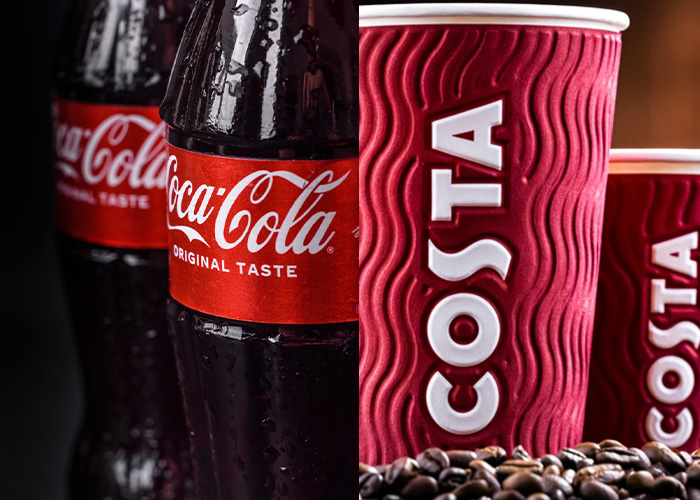Coca-Cola reportedly explores sale of Costa Coffee
Posted: 25 August 2025 | Ian Westcott | No comments yet
Coca-Cola is reportedly considering selling Costa Coffee, potentially at a £2bn valuation. The move highlights the challenges of managing a global café chain and the importance of resilient supply chains.


The partnership between Coca-Cola and Costa Coffee brought together two distinct beverage categories, but the company is now reportedly considering divesting from its hot drinks portfolio. Credit: Shutterstock
Coca-Cola is reportedly working with investment bank Lazard to gauge interest in a potential sale of Costa Coffee, the UK’s largest high street coffee chain. The Atlanta-based soft drinks giant acquired the brand in 2018 for £3.9 billion, aiming to reduce reliance on sugary beverages and enter the hot drinks market. Sources indicate initial talks have begun with a small number of potential bidders, including private equity firms, though the company could still decide not to proceed.
Costa Coffee’s scale and global reach
Costa operates from more than 2,000 UK stores and over 3,000 globally, employing tens of thousands, according to the latest reports. Its footprint spans dozens of countries, including India, Japan, Mexico, and Poland, and it also runs thousands of coffee vending machines under the Costa Express brand. Founded in 1971 by Italian brothers Sergio and Bruno Costa, the chain expanded steadily before being sold to Whitbread in 1995 for £19 million, trading from fewer than 40 stores.
Financial backdrop: restructuring and performance
Costa’s most recent standalone accounts, for 2023, showed revenues of £1.22 billion—a 9% rise on the previous year but below the £1.3 billion recorded in 2018. The 2022 accounts highlighted economic and inflationary pressures, prompting a restructuring programme to manage overheads and invest for growth. Despite these challenges, Costa has returned more than £250 million in dividends to Coca-Cola since the acquisition.
Strategic rationale and operational challenges
At the time of the purchase, Coca-Cola’s CEO James Quincey emphasised Costa’s potential to provide a global platform in the growing coffee sector, noting the company lacked a global hot beverages brand. However, running a network of thousands of stores with complex supply chains—including perishable goods, baked items, milk, and coffee beans—differs significantly from the soft drinks business. The reported exploration of a sale suggests Coca-Cola may be reassessing its ability to manage Costa’s high-street and international retail operations efficiently.
Market context: competition and consolidation
Costa faces intense competition from rivals including Starbucks, Caffè Nero, Pret a Manger, and more upmarket chains such as Gail’s. In the wider sector, similar divestments and strategic reviews are under way, with some brands considering public market flotation or stake sales. For the beverage industry, Costa’s experience underlines the critical importance of supply chain resilience, cost management, and operational alignment in maintaining profitability amid market volatility.
If the sale proceeds, it will represent a significant strategic shift for Coca-Cola and a rare instance of a high-profile divestment in the coffee sector. For industry observers, the situation is a reminder that even established brands with global reach face operational and economic pressures that can influence portfolio strategy and supply chain priorities.
While Coca-Cola is reportedly divesting Costa Coffee after facing operational challenges, Keurig Dr Pepper is expanding strategically with its acquisition of JDE Peet’s. Both moves underscore a broader trend in the global coffee sector: companies are re-evaluating portfolios, sharpening operational focus, and prioritising supply chain resilience to navigate market volatility. Read more about the KDP and JDE Peet’s deal here.








